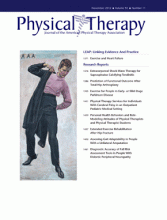<LEAP> highlights the findings and application of Cochrane reviews and other evidence pertinent to the practice of physical therapy. The Cochrane Library is a respected source of reliable evidence related to health care. Cochrane systematic reviews explore the evidence for and against the effectiveness and appropriateness of interventions—medications, surgery, education, nutrition, exercise—and the evidence for and against the use of diagnostic tests for specific conditions. Cochrane reviews are designed to facilitate the decisions of clinicians, patients, and others in health care by providing a careful review and interpretation of research studies published in the scientific literature.1 Each article in this PTJ series summarizes a Cochrane review or other scientific evidence on a single topic and presents clinical scenarios based on real patients or programs to illustrate how the results of the review can be used to directly inform clinical decisions. This article focuses on an 80-year-old woman with heart failure and the impact of exercise training on adverse event risk and quality of life. Can exercise training reduce the risk of adverse events and improve the quality of life in individuals with heart failure?
Approximately 5.7 million Americans are now diagnosed with heart failure (HF), with a current incidence of 670,000 new cases each year.2 Approximately 1 million hospital discharges were attributable to HF in 2007, a trend that has not changed since 1997.2 Similar statistics have been observed throughout the world, and the cost of medical care for HF constitutes a substantial proportion of total health care expenditure.2,3 Given the aging trends in the US population and other nations and the fact that HF primarily affects the elderly population, the incidence, prevalence, and hospitalization and mortality rates of this cardiac condition will likely increase.2,3 These statistics clearly demonstrate the magnitude of HF's …












